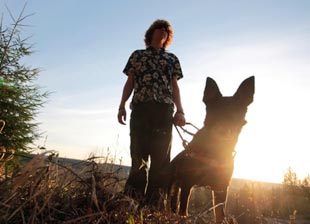 Service animals, pets, and companion animals are important members of every family, as they fulfill different roles. Therefore, it is vital to plan for any animal(s) living in the household as one would plan for a family member.
Service animals, pets, and companion animals are important members of every family, as they fulfill different roles. Therefore, it is vital to plan for any animal(s) living in the household as one would plan for a family member.
A service animal is an animal that may have had training to assist a person in some aspect(s) of daily living. Not every service animal, however, has gone through specific training.
Some families have one or more pets. Pets generally do not assist in tasks associated with daily living.
There are some animals that are companion animals to people with psychiatric and emotional disabilities. These animals should be treated like service animals.
Plan on having your service animal, pet, or companion animal shelter-in-place or evacuate with you. You should make a list of the places you think you might go to if you evacuated. These places might be a family member or friend’s house, a pet-friendly public shelter, or a hotel/motel that accepts pets. You should check before an emergency happens to make sure the place you plan to go to is able to accept your pet(s). Service animals are the exception. Service animals should be accepted at any public location, like a public shelter or hotel/motel, without requiring you to present documentation the animal is a service animal. < see TIP 8
You must be able to provide documentation that any animal you are taking to a public shelter is up-to-date in its vaccinations. If the animal does not have all of its vaccinations, or you do not have paperwork that documents it is up-to-date, the animal will not be allowed in the public shelter.
At the public shelter, you are responsible for taking care of your animal. This means shelter workers expect you to stay at the shelter with the animal, although pets will be housed in an area separate from humans. Only service and companion animals will be allowed to be with their handler or owner. You should plan on having any medications your animal is on with you so that you can give them to the animal at the appropriate times. You should also have a photo ID of your pet with you to provide to shelter workers.
Keep in mind the following as you plan:
| Check | Pet Item |
|---|---|
| Vaccination history and other medical records < see TIP 9 | |
| Medications (if applicable) | |
| Current photograph of your pet(s) | |
| Veterinarian contact information | |
| Pet carrier(s) | |
| Food and water bowls | |
| Leashes, collars, harnesses or muzzles with identification tags | |
| Litter pans (if applicable) | |
| Toys and blankets | |
| Food and water for at least 7 days | |
| Manual can opener to open pet food cans (if applicable) | |
| Documentation of behavioral problem (if applicable) |

